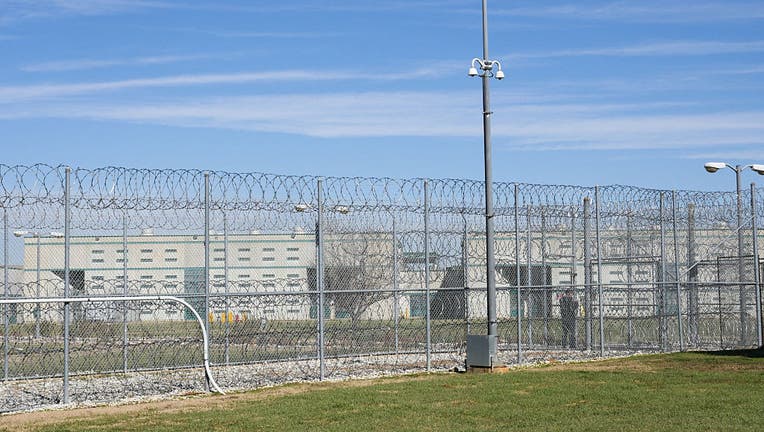Texas House passes bill requiring AC in state prisons

A fence, barbed wire and a guard are visible at the Allan B. Polunsky Unit, the prison that houses the 169 men on Texas' death row in Livingston, Texas, January 22, 2025. The Allan B. Polunsky Unit is a prison with a capacity of 2,984 inmates and an
AUSTIN, Texas - The Texas House on Friday passed a bill that would require state prisons to have air conditioning.
The bill would require the Texas Department of Criminal Justice to install air conditioning at each of its facilities by the end of 2032.
The bill passed on third reading Friday on a 79-39 vote. It now heads to the Senate.
House Bill 3006
House Bill 3006 would allow the TDCJ to install climate control units in three phases, each covering around one-third of the facilities they control.
Each phase is expected to cost around $100 million with the first required to be completed by Dec. 31, 2028. The second phase would be completed by 2030, with the remaining facilities being complete by Dec. 31, 2032.
The bill would also prohibit the use of state funds for the project without the Legislature specifically appropriating funds for the project.
Temperatures inside facilities would be required to remain between 65 and 85 degrees Fahrenheit. The areas requiring temperature control are:
- hospitals;
- visiting areas;
- housing or dormitory areas;
- trustee areas;
- areas used for medical treatment or care, including areas used for dispensing medication to inmates;
- kitchens or dining areas;
- food preparation areas;
- community areas, including dayrooms;
- laundry areas;
- areas used for work stations;
- indoor recreational areas, including gymnasiums;
- restroom and shower areas and other areas related to inmate hygiene;
- administrative areas;
- correctional officer stations, including guard post areas;
- commissary areas;
- areas used for programmatic, educational, or vocational purposes;
- chapels or churches;
- libraries; and
- maintenance areas.
Heat in Prisons
Experts suggest that the lack of air conditioning in correctional facilities poses significant health and safety risks for inmates and staff because of the state's extreme heat conditions.
In March, a federal judge ruled that keeping Texas inmates in prisons that lack air conditioning during excessive heat was unconstitutional, but would not require TDCJ to install temporary air conditioning while the pending court case played out.
Forcing the prison system to install temporary air conditioning units would just slow down the work of the prison system to implement a permanent solution and wouldn’t provide relief any earlier, the court said.
Judge Robert Pitman left the door open for the court to change its ruling on temporary units if the Texas Department of Criminal Justice loses the case and continues to move slowly through the installation process.
"The Court repeats that TDCJ’s current plan to install permanent air conditioning—which on the most generous timeline, would not be complete for another 25 years—is insufficient under the Eighth Amendment," Pitman said in his March 26 ruling.
The ruling came as a group of inmate advocacy groups filed a lawsuit, calling the lack of air conditioning "unconstitutional cruel and unusual punishment."
Court documents estimate 95,000 inmates are housed without air conditioning in the state.
The Texas Department of Criminal Justice has around 46,000 beds that are considered "cool beds." Those beds are in proximity to partial or full air conditioning.
Only 32 of the agency’s 101 units have fully air-conditioned housing areas.
TCDJ classifies 55 units as partially air-conditioned in housing areas, but those units have fewer than 10 cool beds, court documents state.
Heat-related deaths in prison
A November 2022 study by researchers at Brown, Boston and Harvard universities found that 13%, or 271, of the deaths in Texas prisons without universal air conditioning between 2001 and 2019 may be attributed to extreme heat. Prisoner advocates say those numbers are only likely to increase as the state faces more extreme weather and heat due to climate change.
Experts testified last summer that heat index values at or above 88 degrees Fahrenheit can lead to conditions like heat exhaustion, dehydration and heat stroke, even in young and healthy inmates.
Even beyond heat-related injuries, heat can also lead to heart attacks, kidney failure and increased risk of suicide, court documents state.
During an earlier hearing, climate experts testified that summers were getting hotter in Texas and expected to continue climbing.
The Source: Information on House Bill 3006 comes from the Texas Legislature and the House Research Organization. Information on heat in prisons and a pending lawsuit comes from court documents filed on March 26 in the Western District of Texas.

